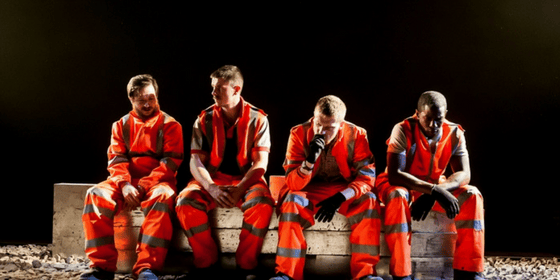
On average, someone takes their own life, by jumping in front of a train, every 31 hours. From this shocking statistic, Kieran Knowles’ play, currently at The Bunker Theatre, takes its title and plot. In ninety minutes the audience get a glimpse of how the events of a Tuesday morning would have a profound impact on a group of work colleagues.
A death on the tracks is a costly and messy affair, as the number of suicides continues to increase, Network Rail employs specialist cleaning teams, who are on call to remove body parts, blood and gore as quickly as possible, in order to get commuters moving again. The four central characters make up one of these teams and we are taken through the consequences of the clean-up operation for them, and others involved.
Some of these deaths are accidental, but there is much heavier focus on the deliberate ones. Desperate souls, mainly males, who end their lives at a platform edge; there’s an entire vocabulary devoted to describing the way their bodies have splintered and shattered. On the face of it, it all sounds rather horrific, but it is presented in a much more sanitised manner, it’s often very funny and the humour helps take away some of the depressing aspects.
The opening minutes of 31 Hours feel like a public information announcement, facts and figures spewing out at considerable pace. It verges on feeling too documentary like, and you could mistake it for a Network Rail training video. But then the rapid stats segue in to far slower, gentler and passionate tales of ordinary people; the train driver, the conductor, a passenger, even the social media assistant trying to cope with the barrage of incoming complaints via Twitter. In these moments we see real theatrical prowess, with the psychological effects being shown as taking their toll; some are whimsical while others are truly heartbreaking.
The actors portraying the four characters, take on these other roles too, it feels like some kind of role play to begin with, as they egg each other on, but somewhat confusingly, that soon dissipates and goes to a more traditional set-up. These four actors all do an exceptional job in transitioning from role to role, and from comedy to tragedy. Amongst them, it is Salvatore D’Aquilla who comes across the most naturally, with his ‘man-up’ monologue drawing impressed gasps from the audience.
Stones and gravel carpet the stage, while railway sleepers are moved back and forth forming various scenes. Props line the edge of each side of the stage, laid out methodically like a crime scene. Adrienne Quartly’s sound design works well in The Bunker, the sound of trains overheard are replaced with low rumbling noises, signaling impending doom.
31 Hours has been written so that in the final scene, any of the actors can play any other role, leaving the option open to the director for the ending to change at each performance. I don’t know if director, Abigail Graham, has taken this option and whether or not you’ll see a different ending to the one I did. Enough hints are dropped for the final scene not to be a shock, what is a surprise, though, is just how emotional it is when it finally comes.
31 Hours may stand on the yellow line, rather than taking us all the way to the edge, but it is still incredibly powerful and urgent, and it is certainly informative. The cast really do breathe life in to each of the roles they pick up as well as exploring their primary characters, and exposing the difficulties faced by the modern-day male.


























